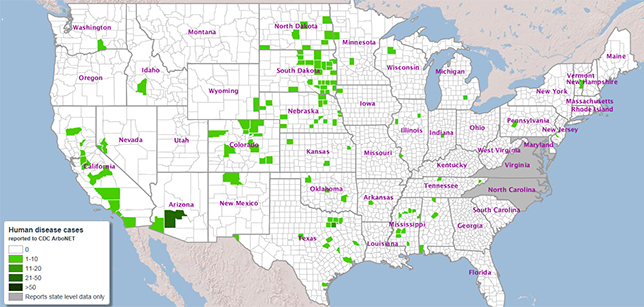
| Aug. 2016 | |||||||||||
| Top stories | |||||||||||
| In the news | |||||||||||
| Photos | |||||||||||
| Contact us | |||||||||||
| Archive | |||||||||||
|
Iowa confirms human cases of West Nile |
The Iowa Department of Public Health (IDPH) announced Aug. 17 that testing at the State Hygienic Laboratory has confirmed the first human cases of West Nile virus disease in Iowa in 2016. A female child and an adult male, both of Sioux County, were hospitalized due to the virus, and were recovering as of the day of the announcement.

Approximately 20 percent of people infected with West Nile virus will have mild to moderate symptoms such as fever, headache, body aches and vomiting. Less than one percent of people infected become seriously ill and rarely, someone dies.
West Nile virus is transmitted by infected mosquitos and is endemic in Iowa.
“West Nile virus season typically lasts from late summer into early autumn,” said IDPH Medical Director, Dr. Patricia Quinlisk. “These cases serve as a reminder to all Iowans that the West Nile virus is present, and it’s important for Iowans to be using insect repellent when outdoors.”
Iowans should take the following steps to reduce the risk of exposure to West Nile virus:
- Use insect repellent with DEET, picaridin, IR3535, or oil of lemon eucalyptus. Always read the repellent label and consult with a health care provider for information about using these types of products on children. For example, DEET should not be used on infants less than 2 months old and oil of lemon eucalyptus should not be used on children under 3 years old.
- Avoid outdoor activities at dusk and dawn when mosquitoes are most active.
- Wear long-sleeved shirts, pants, shoes and socks whenever possible outdoors.
- Eliminate standing water around the home where mosquitoes lay eggs. Empty water from buckets, cans, pool covers and pet water dishes.
- Change water in bird baths every three to four days.
Since West Nile virus first appeared in Iowa in 2002, it has been found in every county in the state, either in humans, horses or birds. In 2015, 14 cases of West Nile virus were reported. The last death caused by West Nile virus was in 2010; two deaths caused by the virus occurred in Iowa that year.
For more information about West Nile virus, visit idph.iowa.gov/cade/disease-information/west-nile-virus.
 Iowa cumulative human disease cases reported to CDC ArboNET for 2016: 2 disease cases
Iowa cumulative human disease cases reported to CDC ArboNET for 2016: 2 disease cases